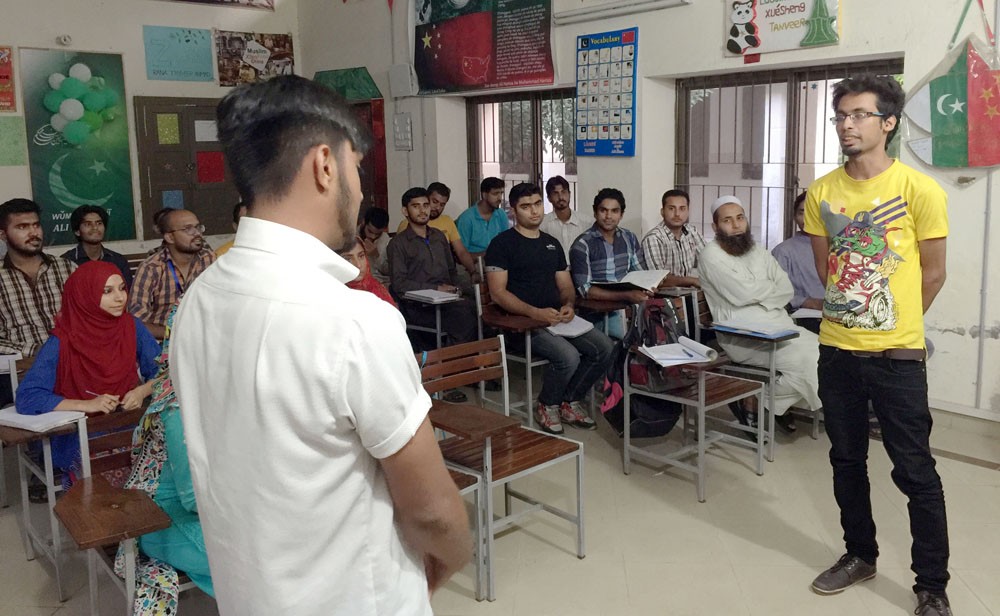
Mandarin Chinese has caught the fancy of the people of all ages and ethnicity and with varying academic or business interests

"I see business opportunities in China," says Nazir Mujahid, who is trying to explain why he recently enrolled at the Technical Education and Vocational Training Institute (TEVTA), Lahore, to learn Chinese language.
Being completely unfamiliar with the language, he was unable to successfully communicate with the people of China when he visited the country last. "We were trying to secure a favourable deal but we suffered a loss. That was when I promised myself I’d learn Mandarin," says Mujahid whose business interest lies in the manufacturing industry.
With scores of Chinese companies expanding their work in infrastructure development, mass transit and energy sectors and, above all, the China-Pakistan Economic Corridor (CPEC), infinite number of jobs for interpreters have sprung up. A knowledge of Mandarin -- said to be the largest of the many Chinese dialect groups -- ensures "you can earn up to Rs0.1 million a month," in the words of Muhammad Faisal, a middle-aged fellow who is a teacher by profession.
According to a Chief Minister’s Secretariat official, there is growing demand of up to 5,000 interpreters, in various projects related to the CPEC alone.
There are academic reasons also, in pursuing the language studies. Amber Fatima, who is presently taking a course in Chinese languages at the National University of Modern Language (NUML), Lahore, says she intends to go for higher studies in China next year. Her reason: "It’s a lot cheaper compared to other countries of the world and also not too far away from home."
Fatima says she knows many senior students in her college who learnt Mandarin and later when they returned from China they got well-paying jobs in different Chinese companies engaged with telecom and construction sectors."
Interest in Mandarin Chinese goes beyond the demographical measures of age and ethnicity. Pakistan’s Embassy in Beijing puts the number of Pakistani students in China down to 8,100. Many more are prepping to follow suit.
China offers around 500 scholarships to Pakistani students in a year. The Ministry of Commerce predicts the CPEC shall create 700,000 direct jobs and that those who are well-versed in Mandarin shall enjoy great dividends.
Some schools have also introduced Chinese language at the primary and secondary levels. So far, the students’ strength is nearly 4,500 at these schools. "But the number is growing," claims Rahat Afirdi, a Chinese language instructor at a private school.
Online courses of the language are also available. Broadly, these include two parallel courses in ‘Basic Chinese Language’ podcast all across the public sector universities of Pakistan.
In order to further strengthen the programme, an MOU was signed with Dr Zhang Daojian, Head of Confucius Institute at NUML on June 20, 2014.
An exclusive chat with Yu Boren, Consul General of China in Lahore reveals that the Punjab government has already sent 66 students to Beijing to learn Mandarin. "The programme shall be expanded in phases in the future, and more and more students shall be sent to China," says the CG.
Expressing great resolve for the promotion of Chinese languages at the freshly-constructed Chinese Consulate, Lahore, located right in front of the Punjab University, Yu Boren says the students shall be required to return to Pakistan and teach Chinese languages in universities and institutes.
So far, Government College University (GCU), University of Engineering and Technology (UET), Punjab University (PU), Kinnaird College for Women University (KCWU), TEVTA, Chamber of Commerce and Industry, and Management and Professional Development Department (MPDD) have opened up Chinese language centres.
Confucius Institutes have also been set up at the PU and the Agriculture University Faisalabad.
To a query, Yu Boren says 6 qualified professionals shall soon be in Lahore to teach Chinese language at the above-mentioned institutions. "We have also purchased five sets of modern language labs from China and we’re going to donate these to the universities and government institutions."
One reason for the trend is the friendly image of China in the minds of the common people. In July 2013, Pew Research Center, as part of its Global Attitudes Project, declared that 81 per cent Pakistanis had a favourable approach towards China.
At TEVTA’s Chinese language class, the popular phrase doing the rounds is: "Chinese is the language of the future."
In the words of Irfan Qaiser Sheikh, Chairman, TEVTA and former president of Chamber of Commerce, "There’s no exaggeration in the statement [above]."
At present, TEVTA is offering a three-month course for the general public and an executive, four-month course. Sheikh says that almost a thousand people have already passed the language courses. "The courses are now being extended to five other cities of the country.
"The beauty of these courses is that not only students but businessmen, lawyers, teachers, judges, skilled labour, policemen, industrialists, traders, agriculturists, and pharmacists are also enrolling," he says.
Muhammad Javed, Principal of Government Technical Training Institute, Gulberg, Lahore, who is conducting the Chinese language courses, says the weekly classes are packed. "We’ve received 600 applications for our 100 available seats, which goes to show that Mandarin is gaining currency."
The minimum qualification required for enrolment in these courses is Matric.